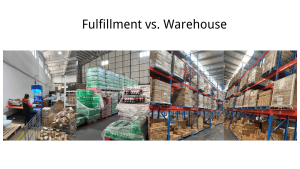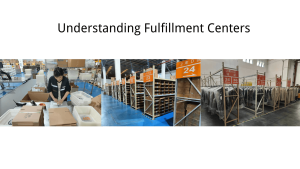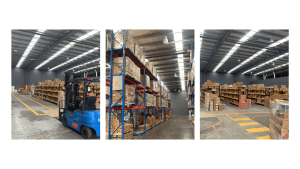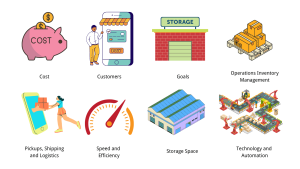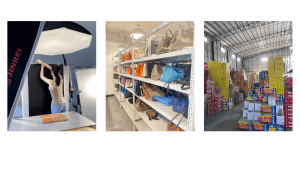Your Strategic Partner for
Unlocking China's Sourcing Potential
How Does the Fulfillment Center Compare to Warehousing?
The terms “warehouses” and “fulfillment centers” are often used similarly and are thought to be similar. But in fact, they are very unlike. The similarities between fulfillment centers and warehouses end there, although both are sizable structures that house inventory for companies that sell goods.
Depending on the needs of the organizations using them, each offers various services, and other situations call for multiple uses of each.
Here, we’ll go over the roles of each so you can choose which is best for you and your company’s needs. It may help you decide what will help your company grow more. And may it be a guide for you.
1. What are a Fulfillment Center and a Warehouse?
A Fulfillment Center is like a warehouse that stores goods for firms, but that’s it. That is the only thing they have in common. Fulfillment Centers typically hold fast-moving products that are most of the time shipped out. Its job is to bring the orders to customers as soon as possible.
Fulfillment Services works with various companies such as retailers, e-commerce, corporations, and others to fulfill B2B and B2C orders and shipping orders to end-users.
The Fulfillment Center is a wild place. Most of the time, people process, pack, label, and ship products to customers.
Also, customer returns may come back to the inventory to deal with. To ensure a smooth process, fulfillment centers have the best technology for processing, managing, and organizing orders.
On the other hand, a Warehouse is where products and goods are held longer. It is designed to keep or store your business’s inventory in bulk as long as it needs to stay. You can see high shelves on top of each other with many products and forklifts roving around to move the containers.
The work in a Warehouse every day is a cycle. Products go to stock, moved where they should be, and shipped out. Usually, it is wise and better to be used smaller or mid-sized sellers to have a warehouse.
2. Understanding Fulfillment Centers
1) Definition and Function
A Fulfillment Center does more than a warehouse simply stores your products. It is also called a third-party logistics (3PL) or order fulfillment company, which holds inventory and quickly takes care of customer order fulfillment before shipping. They work with companies to fulfill B2B and B2C orders.
An Order Fulfillment Center has to get products out to customers who ordered as fast as possible. Unlike the warehouse, the stock will only sit for a short time. Retail orders are usually sent out from this service than from a warehouse. They serve external customers, which is their main focus.
Fulfillment Centers are often busy with work. Due to more work being done fast, they have the best kit for processing orders, handling stocks, organizing loads, and other work.
2) Advantages of Using a Fulfillment Center
-
Cost Savings
Most Fulfillment Centers have connections in global facilities. It allows discounts that you can benefit from in bulk deliveries. Some centers base their shipping fees on the zone. You can save more if you keep your products in multiple fulfillment centers.
There will be fewer zones to enter for your goods to go to customers. You will also be able to offer free shipping for customers. It will be a great mark on their online shopping decisions.2. Improved order fulfillment accuracy
-
Improved Order Fulfillment Accuracy
By working with fulfillment centers, they will keep, pack, and ship your orders. You will also gain the experience of their employees, software, and equipment. They know what they will do and are sure in every step for your goods. Every product you send to customers will be accurate and have no errors.
It is easier to keep a customer than to find a new one. While having many rivals in the business, customer joy should be your focus. Fulfillment centers will be able to serve them. Customers can track their orders and tell them when they will have them.
-
Increased Storage Capacity
Many companies just starting are working in their attics, basements, garages, or any place where they can keep their goods and supplies. As usual, these kinds of workplaces could be better. You can see boxes, bubble wrap, tape, and other packing supplies lying around the floor.
With a fulfillment center, you can let them do this work for you. You will have a cleaner office, and your life will be easier. It will allow you to focus more on other parts of your business. Also, you can use their vast space to store your products. You will also be able to produce more supplies.
-
Access to Advanced Technology and Resources
You can take the edge of monitoring stocks, securing customer data, tracking shipments, and processing payments with fulfillment centers. Trusted centers have these gains for you to use and offer the best quality service for your customers.
It is a big investment for a big impact in having your firm a good name. Many fulfillment centers have this modern software so that you can gain access to the best software known for a cheaper cost.
3) Types of Fulfillment Centers
-
Retail Fulfillment Centers
Retail Fulfillment Centers process your orders by collecting, keeping, and sending them to your clients. Many jobs are done here, including but not limited to accepting goods from sellers, keeping them on shelves, processing orders online, and handling returns.
Retail firm owners mainly use this type of fulfillment center. The products are for clients’ consumption, use, or fun. These bought things and services are sold online or over the phone and kept in the hub. Some retail firms that use it are clothes, comfort stores, drugs, and grocery.
-
Wholesale Fulfillment Centers
Wholesale distributors use boats, planes, and trucks to move goods. They also do other work, such as repacking and restocking. It makes your goods finalized before clients see them to make avail.
To make it happen, distributors can use many wholesale fulfillment centers to do the job fast yet at a lower cost. Wholesale distribution is needed in the supply chain. It allows you to sell and ship many goods to customers.
-
Cross-Docking Fulfillment Centers
A cross-docking fulfillment center has minimal storage space. Goods that come here are sorted fast according to the arrival and dispatch of shipments and shipped out directly. The job is done in this center within 24 hours.
Cross-docking lessens hold works and labor by moving loads from one carrier mode to another facility as soon as possible. It helps you save delivery costs and time. This center is used for perishable loads to keep their value.
-
Custom Fulfillment Centers
Custom Fulfillment Centers can move your little details to a bigger scale. It allows you to sell more goods and assist more clients with buying decisions. Ask your trusted centers about their custom choices for your next orders.
You can ask them specific requests or give special tasks on how to pack your goods. That is how you will have your custom fulfillment. And they will work with your goods to hold, store, and send them to clients.
3. Understanding Warehouse
1) Definition and Function
A Warehouse is designed to keep your stock in bulk as long as needed. They are focused more on firms that do wholesale or business-to-business orders that deal with many products.
Bigger retailers have fulfillment warehouses to store extra goods or rent them to other retailers. If you need to keep your extra products and more space, a warehouse is what you need.
2) Advantages of Using a Warehouse
-
Control Over Inventory Management
A warehouse is a big help for you to manage holds by tracking. Assuming your business uses a small space to keep goods before sending them to your clients, knowing what goods need to be sent out and when will take a lot of work. A warehouse will help you track how much space your hold takes up.
Having a warehouse means you can have better control over your inventory. It will allow you to boost your stock turnover. It will make your shipping process faster and cheaper. You will be sure that your goods are taking up the correct amount of space as they should be.
-
Access to Larger Storage Space
Warehousing will allow you to store your extra or bulk goods. When the need for these goods increases, you can get them in the warehouse. It is a way to keep goods in a budget-wise and handy manner.
Having a warehouse will let you avoid extra costs for paying holds. Also, you will be sure that your products are in good hands and secured. Spaces for holding your goods in the warehouse are climate controlled.
It will prevent your goods from spoiling, especially those with short shelf life. And your goods will be safe from natural disasters such as storms, hails, and others.
-
Ability to Handle Large Quantities of Goods
You can track your holds and sales if it is in one place accurately. It gives you a better view of what goods to sell and how many. You can use the warehouse’s logistics software that details how many goods you have, their location, and when you should restock. It will make all the methods easier and save more money.
You will be able to fill your shelves faster and in large numbers. And, you will not need to wait for shipments or consider lowering order lead time. You can get new goods onto the warehouse when it is in demand.
-
Customizable Storage Options
Having your warehouse has a fixed cost. However, if you are working with a 3PL, you can change the shelf space you use from every period. If the demand for your goods is high, you can expand your storage space. And if the demand is low, you can have lesser stocks.
You will only need to pay for the space you use in the warehouse. It will allow you to save money as you only need to pay for your needs.
3) Types of Warehouses
- Public Warehouses
The government owns a public warehouse, and is available to private-sector firms. You can rent out these warehouses for personal use or business. It is a good choice for business owners who only need to store goods temporarily.
It is mainly used by a business that is just starting or new. E-commerce and startups use this because it is cheaper than a private warehouse. It is basic in terms of setting. It does not have advanced tools, unlike other types.
- Private Warehouses
A private warehouse can also be known as proprietary warehousing. It is a warehouse owned by a firm unit. You must fund securing the space, management, and general care if you want a private hold. Distributors, manufacturers, and wholesalers mainly use it.
You may need to pay more than a public warehouse, but they give you more overall control of their stock management. You can do what you want with the space you are paying for.
- Bonded Warehouses
Bonded warehouses are also called customs warehouses. It is where imported goods can be kept, assigned, or go under manufacturing works without payment. The warehouse will be yours for five years from the day you accept it.
The job on imported goods can be very high, so the warehouse allows them to be sold first, and then duty is paid from finishing the sale.
- Cold Storage Warehouses
Cold storage warehouses store goods that are sensitive to low temperatures. It allows artworks, candles, cosmetics, foods, and medicine to have a longer shelf life. For both in and outbound shipping, cold storage holds use refrigerated shipping.
4. Key Differences Between Fulfillment Centers and Warehousing
The build and purpose of a fulfillment center may look the same as a warehouse’s, but they are different. How do they differ in how they work? As you look at them, they may look similar, but they differ in how they work and what they are used for in many ways.
Here are the key differences between fulfillment centers and warehousing that may help you tell what you will need for your business:
1) Cost
Compared to a fulfillment center, which needs a large workforce, a warehouse can be automated and require less toil. A warehouse will lower labor costs and boost gains for the firm. Since there will already be a distribution hub to handle the shipping, this is mainly true for firms with multiple places.
2) Customers
The warehouse works mainly with B2B clients. It is commonly used by firms that store their wholesale products. At the same time, fulfillment centers are designed to service directly to customers and for online orders.
It is known as e-commerce firms and B2C. Some fulfillment centers may serve B2B and B2C, working both e-commerce and retail orders for labels.
3) Goals
The warehouse’s goal is the efficient and safe storage of goods for a long period. It is mainly limited to storing up to a handful of holds for an extended period.
On the other hand, the goal of a fulfillment center is to process orders as fast as possible. These centers are not designed to keep holds for over a few months.
4) Operations Inventory Management
Holds in and out of a warehouse are put in a pallet container. And as such, a cargo carrier or even an intermodal provider is involved in most warehouse logistics operations. While holds in a fulfillment center are palletized but out as individual packs.
Fulfillment centers often keep goods for a short time. It focuses on picking and packing the products to fill orders. We will send the orders directly to the buyers.
5) Pickups, Shipping, and Logistics
A regular flow of goods starts once the customers place orders with the fulfillment center. Shipping companies will have numbers of pickups to deliver to customers on time. Some shipping lines may designate specific pick-up times and days, while others may do it daily.
A warehouse is mainly used for keeping goods for a long time. Pickups of goods are done less frequently and offer less flexibility when it comes to shipping solutions for customers and sellers.
It may be cost-effective when shipping some items to an address with the same expected delivery date and may be slower than you would want.
6) Speed and Efficiency
A fulfillment center may have ties with most other shipping firms. It needs shipping runners to collect loads at least daily because it does direct-to-consumer orders once they are placed. It ensures that orders will be delivered to buyers on time.
A warehouse will typically need to be scheduled. It is more cost-effective to ship freight and have boxes put together on a pallet than making unique shipping labels. It may cause less frequent pickups.
7) Storage Space
Warehouses are mainly used for keeping inventory surplus or goods sold seasonally, while fulfillment centers are for short-term storage.
It means fulfillment warehouses have more space to keep all the goods safe and secured. And fulfillment centers will need just enough room to receive and send orders to the customers.
8) Technology and Automation
Fulfillment centers use advanced analytics media, electronic data interchange, and logic-based tech to see room for improvement. In contrast, an order fulfillment warehouse technology uses a warehouse management system that automates inventory control and syncs various jobs.
5. Benefits of Fulfillment Center vs. Warehouse
The fulfillment center and warehouse may have similar services but differ in their utilization. Here are the benefits that you can get from them:
1) Benefits of Fulfillment Center
• Good Customer Service • Improve Scalability • Lessen Operating Costs • Lessen Shipping Costs • More Focus • More Space • Provide Customization • Reach More • Utilize the Technology • Work with Experienced Centers
2) Benefits of Warehouses
• Accessibility • Better Inventory Management • Better Records • Better Security • Cheaper Labor Costs • Consolidation • Easy Distribution • Efficient Production • Faster Turnover • Higher Customer Satisfaction • Less Risk • More Storage
6. Factors to Consider When Choosing Between a Fulfillment Center and Warehouse
Here are some factors that you will need to consider when choosing between a fulfillment center and a warehouse for your business:
1) Business Type and Size
A fulfillment center can provide its services to many merchants who need to fulfill customer orders instead of a warehouse used by one company or business.
2) Inventory Volume and Product Type
A warehouse is a good, cost-effective option if you are a big firm and need to store many products for any time before shipping them out to another business.
On the other hand, outsourcing order fulfillment through a fulfillment center can ease the burden if you’re a small to mid-size operation and spend too much time packing and shipping.
3) Shipping and Logistics Requirements
If your business model is B2B, where your main target client is other firms, you will mostly need a warehouse to store your goods for a longer time and sell them later.
On the other hand, outsourcing fulfillment centers makes more sense if you are a growing e-commerce firm whose target audience is the direct client.
4) Budget and Cost Considerations
A warehouse is right for you if you are an e-commerce or a startup business. It will be cheaper, and you will have enough space to start a firm. But if you are already a stable firm owner and get orders more often, it is best to work with fulfillment centers.
5) Access to Technology and Automation
Warehouses depend on terms of access to technology and automation. The cheaper, or the public warehouse, for example, the less tech you will have access to, but working with a more expensive warehouse, such as a private warehouse, you can use their advanced tech.
While in a fulfillment center, it is ensured that they have modern techs needed to process orders, especially goods that need to be sent out to clients as quickly as possible.
7. Conclusion
If you run a small or medium-sized business, it is vital to regard your shipping and storage requirements before making this choice. It may be time to think about outsourcing your fulfillment process if you learn that you spend a lot of time making boxes and sending out orders.
Also, you might need more storage space depending on the place you have. Storage units can be cost-effective if you need more room to store your goods.
A warehouse might make sense as your company expands and you need more space, but in the age of online shopping, a fulfillment center is much more functional and can take on many tasks at once.
The topics discussed may help you more on what you should choose for the betterment of your company.

